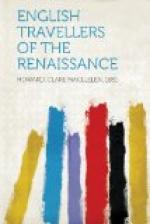In short, the object of the Grand Tour was to see and be seen. The very term seems to be an extension of usage from the word employed to describe driving in one’s coach about the principal streets of a town. The Duchess of Newcastle, in 1656, wrote from Antwerp: “I go sometimes abroad, seldom to visit, but only in my coach about the town, or about some of the streets, which we call here a tour, where all the chief of the town go to see and be seen, likewise all strangers of what quality soever."[305] Evelyn, in 1652, contrasted “making the Tour” with the proper sort of industrious travel; “But he that (instead of making the Tour, as they call it) or, as a late Embassador of ours facetiously, but sharply reproached, (like a Goose swimms down the River) having mastered the Tongue, frequented the Court, looked into their customes, been present at their pleadings, observed their Military Discipline, contracted acquaintance with their Learned men, studied their Arts, and is familiar with their dispositions, makes this accompt of his time."[306] And in another place he says: “It is written of Ulysses, that hee saw many Cities indeed, but withall his Remarks of mens Manners and Customs, was ever preferred to his counting Steeples, and making Tours: It is this Ethicall and Morall part of Travel, which embellisheth a Gentleman."[307] In 1670, Richard Lassels uses the term “Grand Tour” for the first time in an English book for travellers: “The Grand Tour of France and the Giro of Italy."[308] Of course this is only specialized usage of the idea “round” which had long been current, and which still survives in our phrase, “make the round trip.” “The Spanish ambassadors,” writes Dudley Carleton in 1610, “are at the next Spring to make a perfect round."[309]




